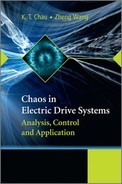Preface
Chaos is a phenomenon that occurs in nature, from as large as the universe to as tiny as a particle. The concepts of chaology have penetrated into virtually all branches of science and engineering. In the field of electrical and electronic engineering, recent research has covered a wide spectrum, including the analysis of chaos, the stabilization of chaos, the stimulation of chaos, and the application of chaos.
There are many books that deal with the field of chaology, focusing on the theoretical analysis of chaotic systems and the mathematical formulation of chaotic behaviors. In recent years, some books have begun to deal with chaos in electronic engineering, especially in the areas of electronic circuits and telecommunications. Although chaos and its practical application in electric drive systems have been widely published as papers in learned journals, a book that comprehensively discusses chaos in electric drive systems is highly desirable.
The purpose of this book is to provide a comprehensive discussion on chaos in electric drive systems, including the analysis of their chaotic behaviors, the control of their chaotic characteristics, and the application of their chaotic features. Contrary to other books which usually involve intensive mathematics or idealized experiments, this book aims to use a minimum of mathematical treatments, extensive computer simulations, and realistic experimentations to discuss chaos in various electric drive systems, including DC drive systems, AC drive systems, and switched reluctance drive systems. Also, while other books consider that the relevant application of chaos or chaos theory is to model or simply explain some strange behaviors, this book aims to discuss and explore the realistic application of chaos in electric drive systems, especially the utilization of chaotic motion for compactors, mixers, washers, HVAC devices, and grinders.
While an electric drive can be chaoized by a simple parameter and stabilized by a feedback controller, my life is also chaoized by a naughty boy and stabilized by a wonder woman. I would therefore like to take this opportunity to express my heartfelt gratitude to my son, Aten Man-ho, and my wife, Joan Wai-yi, for their existence in my life.
K.T. Chau
The University of Hong Kong, Hong Kong, China
Since its first introduction by Poincaré in the 1890s, chaos has been discovered in many disciplines. Although it was previously identified as a scientific problem, chaos is being paid more and more attention by engineers today. As a person engaged in electrical engineering, I got to know chaos when I read a book about nonlinearity in power systems. My first impression was that chaos was interesting, but so complicated, and with increasing knowledge I began to realize that chaos was actually a “conservative” guy with a messy outlook but a beautiful intrinsic property.
I became familiar with chaos when I started my PhD study at The University of Hong Kong (HKU) in 2004. Encouraged by my supervisor, Professor K.T. Chau, I was connected closely with the area of chaos in electric drives. By that time, Professor Chau had already developed a lot of pioneering work on the identification, analysis, and stabilization of chaos in electric drives. As in other disciplines, the innovative idea of the positive utilization of chaos in electric drives had just started in Professor Chau's group. My work then focused on chaotic drives, in particular on their industrial applications. When Professor Chau told me about his book proposal, I felt very happy as some of the creative work by our group on this topic could be introduced systematically worldwide. Most importantly, we hope that more people might pay attention to this multidisciplinary area, not only scientifically, but also in an engineering capacity. We also hope that more colleagues join us in this area!
Finally, I would like to take this opportunity to express my appreciation to Professor Chau for his guidance and for allowing me to participate in the writing of this book; to Professors Jie Wu and Ming Cheng for their support during my master's degree and work at the Southeast University of China (SEU); and to my group fellows in HKU and SEU, whose work has greatly excited me. I also wish to acknowledge the genuine support and unselfish care I have received from my parents at all times.
Zheng Wang
Southeast University, China
